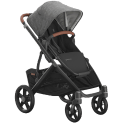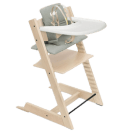
Your Comprehensive Guide to Pregnancy Hormones
Pregnancy is a beautiful (and wild) ride—a transformative experience that is marked by significant physiological and emotional changes. Hormones are the chemical messengers that jumpstart these changes, ensuring your body is prepared for pregnancy, labor, and eventually, motherhood. Understanding the role of these hormones and the impact they’ll have
What Are the Main Pregnancy Hormones?
These hormones are the key players while you’re expecting:
Follicle Stimulating Hormone (FSH)
FSH is made by the pituitary gland and plays a critical role in the reproductive processes that make pregnancy possible. During the first half of your menstrual cycle, FSH stimulates the growth of ovarian follicles in preparation for ovulation and increases estrogen levels. Rising estrogen triggers a surge of luteinizing hormone (LH) and ovulation.
Luteinizing Hormone (LH)
Like FSH, luteinizing hormone is made by the pituitary and regulates your menstrual cycle. An LH surge signals your ovary to release a mature egg, a process known as ovulation. After ovulation, the ruptured follicle becomes the corpus luteum. If you aren’t pregnant, the corpus luteum will disintegrate, lowering hormone levels and triggering your menstrual cycle. If you are pregnant, the corpus luteum secretes progesterone to prepare the uterine lining for implantation.
Human Chorionic Gonadotropin (hCG)
hCG is produced shortly after a fertilized egg attaches to the uterine lining and signals to the rest of your body that you’re pregnant. It’s responsible for nurturing your embryo and ensuring the proper development of the placenta, a vital organ during pregnancy that facilitates the exchange of oxygen, nutrients, and waste between mother and baby.
During the first ten weeks of pregnancy, hCG levels rise rapidly, often doubling every two days, before peaking between weeks seven and ten and then declining at the start of your second trimester. This hormone also ramps up estrogen and progesterone production, ensuring that your uterus is prepared to grow your baby.
hCG is eliminated through urine—it’s the hormone at-home pregnancy kits use to recognize pregnancy. A less fun fact: It’s believed to be the hormone likely responsible for morning sickness. Women with higher hCG levels were more likely to report severe nausea or frequent vomiting.
Estrogen
Along with progesterone, estrogen is a critical hormone in early pregnancy. It sustains uterine growth, maintains the uterine lining, and kickstarts fetal organ development. Like progesterone, estrogen levels increase during pregnancy and decline immediately following childbirth. Estrogen levels remain suppressed during breastfeeding—lower than pre-pregnancy levels—and will gradually rise once your baby is six months old.
Progesterone
Known as the “pregnancy hormone,’” progesterone plays a critical role in early pregnancy, preparing the uterine lining (endometrium) for implantation. It helps your uterus accommodate your growing baby and prevents premature contractions. Progesterone production goes into overdrive after conception, and levels continue to rise throughout your pregnancy, peaking in the third trimester. Following the delivery of your placenta, progesterone levels crash and won’t return to pre-pregnancy levels for up to six months.
Relaxin
Relaxin is secreted by the corpus luteum and later, as your pregnancy progresses, by the placenta. Its levels surge during the first trimester and remain elevated throughout your pregnancy. As the name implies, relaxin relaxes uterine muscles—preventing contractions in early pregnancy—and lengthens and softens your cervix. It loosens the ligaments surrounding your pelvic bones, preparing your body for childbirth. It also makes cardiovascular adjustments, relaxing your arteries so that your increasing blood volume doesn’t result in sky-high blood pressure.
The downside of relaxin? It’s loosening all your joints and ligaments, so you may experience achiness in your ankles, shoulders, hips, and knees (and you may find that you’re clumsier, too). It could also cause your feet to widen or lengthen, a permanent side effect (but here’s to shoe shopping!).
Placental Growth Factor
Placental growth factor promotes blood vessel growth and creates a robust vascular network for your growing fetus, which is vital in early pregnancy. It’s critical for the development of the placenta, ensuring that essential nutrients are transported from mother to baby.
Low levels of placental growth factor are associated with the onset of preeclampsia, a potentially serious pregnancy complication characterized by high blood pressure, and fetal growth restriction.
Human Placental Lactogen (hPL)
hPL is produced by the placenta and modulates metabolism, ensuring the growing fetus receives key nutrients and oxygen. It prepares your body for breastfeeding and helps generate colostrum, the first nutrient-dense breast milk released by your mammary glands after birth.
For some women, increased levels of hPL can lead to insulin resistance and gestational diabetes.
Oxytocin
Oxytocin is a hormone produced in the hypothalamus and released into your bloodstream by the pituitary gland. It plays a critical role during childbirth and postpartum: It signals the uterus to contract during labor, activates the pleasure center of your brain to promote bonding, and helps move milk from breast ducts into the nipple.
Prolactin
Prolactin plays a central role in stimulating milk production. It helps enlarge your breasts and prep your mammary glands for milk production during pregnancy. Once you welcome your baby into the world, you’ll produce colostrum, a nutrient-rich precursor to breast milk, before ramping up to full-scale milk production in the days following birth. If you breastfeed, prolactin levels will remain elevated until you wean. If you’re not nursing, prolactin will return to pre-pregnancy levels within a few weeks.
Finding What’s Right for You
Albee Baby is the oldest family-owned specialty baby shop in the US, and we pride ourselves on providing our customers with the best assortment of baby products anywhere, at fair prices, always. We’re committed to being an inclusive resource for parents and hope you feel empowered to find the right baby gear for your family. Still have questions? Feel free to contact our baby gear experts at 877.692.5233 or info@albeebaby.com.
 Car Seat Sale
Car Seat Sale
 Stroller Sale
Stroller Sale
 Home Sale
Home Sale
 Feeding Sale
Feeding Sale
 Activity & Entertainment Sale
Activity & Entertainment Sale
 Bath & Potty Sale
Bath & Potty Sale






 Car Seats
>
Car Seats
>
 Strollers
>
Strollers
>
 Cribs
Cribs
 High Chairs
High Chairs
 Baby Carriers
Baby Carriers
 Travel Cribs & Playards
Travel Cribs & Playards
 Wagons
Wagons
 Home
>
Home
>
 Bath & Potty
>
Bath & Potty
>
 Diaper Bags & Backpacks
Diaper Bags & Backpacks
 Toys
>
Toys
>
 Gifts
>
Gifts
>
 Clothing
>
Clothing
>

















 Infant Car Seats
Infant Car Seats
 Convertible Car Seats
Convertible Car Seats
 All-in-One Car Seats
All-in-One Car Seats
 Booster Car Seats
>
Booster Car Seats
>
 Travel Systems
Travel Systems
 Car Seat Accessories
Car Seat Accessories
 Single Strollers
Single Strollers
 Double Strollers
Double Strollers
 Single-to-Double Strollers
Single-to-Double Strollers
 Lightweight & Compact Strollers
Lightweight & Compact Strollers
 Jogging Strollers
Jogging Strollers
 Bicycle Trailers & Child Seats
Bicycle Trailers & Child Seats
 Stroller Accessories
Stroller Accessories
 Stroller Frames
Stroller Frames



































